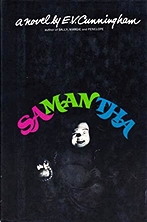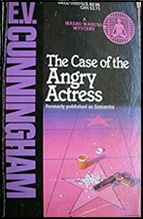Wed 19 Jan 2022
A 1001 Midnights Reviw: E. V. CUNNINGHAM – Samantha.
Posted by Steve under 1001 Midnights , Reviews[2] Comments
by Julie Smith & Bill Pronzini
E. V. CUNNINGHAM – Samantha. Masao Masuto #1. William Morrow, hardcover, 1967. Popular Library, paperback [date?]. Also published as: The Case of the Angry Actress. Dell, 1984.

Samantha was a pathetic Hollywood hopeful who ended up on the casting couch with a succession of unscrupulous men. Even then, she failed to land a part. Eleven years later, the men are being murdered, apparently in revenge. Each of them is now married to a woman who just might be Samantha with a new name. Detective Sergeant Masao Masuto of the Beverly Hills Police Force has his work cut out for him.
This is the book that introduced Masuto, a Zen Buddhist like his creator, who is actually the prolific Howard Fast writing under a pseudonym. A Nisei who lives in a Culver City cottage with his wife, three children, and his beloved rose garden, Masuto is culturally about as distant from the fast-lane denizens of Beverly Hills as a cop can get. Yet he declines to let them rattle him; he doesn’t envy, despise, or judge them.
His trademark cool — sometimes masking a very human inner turmoil — is as appealing as his sometimes acerbic wit. The Hollywood crowd, not surprisingly, is mystified by him and his Zen ways; he explains himself with a disarming simplicity that leaves them even more baffled.

The contrast between the two cultures he moves between is the chief charm of this and the other Masuto mysteries, among them The Case of the One-Penny Orange (1977), The Case of the Russian Diplomat (1978), and The Case of the Poisoned Eclairs (1979).
Before creating Masuto, Fast published, under the Cunningham name, a number of non-series thrillers utilizing the first names of their female protagonists as titles. Some of these have serious themes: Sylvia (1960), Phyllis (1962). Others are comedic in tone: Penelope (1965), Margie (1966). Most have rather outlandish plots that entertain despite putting a strain on the reader’s credulity.
Fast’s first crime novel, Fallen Angel (1952), originally published under the pseudonym Walter Ericson, was made into the 1965 film Mirage, with Gregory Peck and Walter Matthau; both novel and film are taut and engrossing but suffer from that same lack of believability.
———
Reprinted with permission from 1001 Midnights, edited by Bill Pronzini & Marcia Muller and published by The Battered Silicon Dispatch Box, 2007. Copyright © 1986, 2007 by the Pronzini-Muller Family Trust.
January 19th, 2022 at 10:28 pm
My theory, and that’s all it is, is that Fast used Masuto as the protagonist of SAMANTHA as one of his “single female name” series without intending for him to be more than a one-shot character. But after the book was published, he decided Masuto had series character possibilities, and he then continued using him in books with titles beginning with “The Case of the …”
This is reinforced by my discovery that when SAMANTHA was reprinted by Dell, they changed the title so as to be more obviously in the “The Case of the …” series.
I did not know that before tonight.
January 20th, 2022 at 10:42 pm
There are three other reoccurring characters in the Cunningham books,John Comaday and Larry Cohen appear in PENELOPE and MARGIE. Harvey Krim in CYNTHIA and LYDIA.